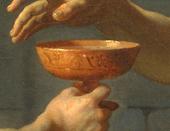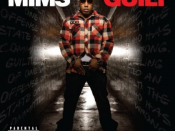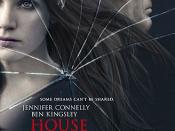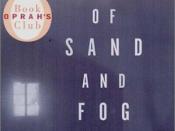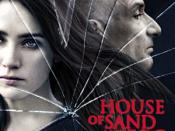A loud gunshot noise resonates through the Keller house. As he pulled the trigger ending his worthless life, the drama and the arguments wither away. The house by the sandy beach remains quiet as the fog approaches. The colonel lies on the bed dressed up for his own funeral. His thoughts slip away as he lay breathless. Despite the different endings, both of these stories share a particular resemblance in the way egotistical people tend to think of themselves over others. We can inspect the nature of tragedy, by examining key character relations, guilt within the characters, the element of corruption and fate that is prevalent in these stories.
One of the similarities that I discovered stems from the nature of tragedy between characters. As I contemplated the significance of the father/son relationships, the similarity jumped out at me unexpectedly. It seems like the central deaths in these plays are indirect and between the father and son.
They are fueled by guilt and emotional investment by both parties as they lead to each otherÃÂs demise. The indirect natures of these murders are quite intriguing; it is difficult to say who initiated this sequence of deaths. Upon first inspection it seemed to me that the father slays the son in ÃÂAll my sonsÃÂ while the Son slays the Father in ÃÂHouse of sand and fogÃÂ. This reversal of roles seemed very interesting to me. On paper, this is what it reads like: The father in ÃÂall my sonsÃÂ sold faulty cylinder heads that cost the lives of soldiers, upon hearing this, the son couldnÃÂt live with himself, committing suicide. Upon recognition of this misfortune the father takes his own life at his house. The father in ÃÂhouse of sand and fogÃÂ bought a house that was not rightfully his, the rightful owner and her lover started fighting back for it which ended up with the murder of the son by the police, who was standing up to defend himself and his dad. The only fact that we can say for certain is that one sold and the other bought; personal gain was the motivation. What these fathers didnÃÂt know was that these transactions would bring about their own collapse. I started digging deeper as was not yet satisfied with my initial verdict; I thought I was onto something as I analyzed the events leading up to the deaths. I believe thereÃÂs almost a philosophical paradox in the nature of tragedy. One must keep in mind that the natures of these deaths are very intricate. There is a blurry line between suicide and murder, and there are a few questions that must be answered before one knows for sure; is it safe to assume that a man driven to suicide by another man is an act of murder? Or is the so called ÃÂmurderÃÂ determined by the manÃÂs poor decisions that sow the emotional seeds of self-guilt, self-hate, self-destruction inside the person that result in his own suicide. It may even be neither of these. From the perspective of civil law these questions are irrelevant as the law dictates that the son from ÃÂall my sonsÃÂ is MIA, the father an innocent man who lost his son to the war effort, his partner Steve a guilty man. In ÃÂhouse of sand and fogÃÂ the father a suicidal victim, the son a victim to a crossfire shooting, and Lester an incompetent deputy who harassed the rightful owner of the house and is now jailed.I believe that the average law system is not suitable for these questions, as it is usually the case in real life examples. Even though it does the best job it can, the sad truth is that it puts an abstract label on incidents that are much too complex. The answer to this paradox is debatable. Although this information may be irrelevant to the real truth; the truth about the initial downward spiral in these tragedies.
Joe Keller did lose one son, but not to the war effort, but to his own war with morality. The internal quarrel that he chose to forget. He knowingly shipped faulty parts due to the pressure to meet the shipment date. He claims it was necessary to keep the military contract, has resulted in the loss of his son, as well as the sons of other families. Through out the story he tries to reinforce his belief that he is lawful. ÃÂBecause it's good money, there's nothing wrong with that money. (trying to convince both himself and Chris)ÃÂ (125) Joe exclaimed. ÃÂYour brother's alive, darling, because if he's dead, your father killed him.ÃÂ ÃÂHe never flew a P-40, what's the matter with you? (trying to absolve his guilt)ÃÂ ÃÂ: Dad... Dad, you killed twenty-one men!ÃÂ(156) Chris cried out. Larry ended up sacrificing himself for his fatherÃÂs sins as soon as he heard what he did. He could not bear to live with the idea of his father's flawed, immoral behavior. Behrani lived a hazardous life as he escaped homeland to avoid conflict. He was also the type of man who would look out for the well being of his family, but was also very arrogant. His arrogance stemmed from the fact that he wanted power in his family and would not take anyone elses opinion into consideration. ÃÂtomorrow you will begin packing, and thereÃÂs no more to discuss.ÃÂ Behrani barks the order at his wife. He was blinded by the hope that he could see into infinity, like the gods, even before he moved to America. ÃÂto reach infinity with our eyes, to see foreverÃÂ exclaimed behrani. This hunger for power made him buy a house that he later found out was not rightfully sold. Despite this, his motivation for profit was too great to sell the house at even the original price back to the rightful owner. His son looked up to his father and eventually stood up for his beliefs. He could not bear to see his father ÃÂmistreatedÃÂ and decided to defend him, causing his life to come to a tragic end. Only when his son was shot did he realize the wrongfulness in his actions. ÃÂPlease god, donÃÂt take my joon-am. I will give everything to one who is less fortunateÃÂ he shouted, praying to the gods. Honesty only comes out of ones guilty conscience when it benefits them.
Fate had dictated the future for both of these families. Both the sons ended up giving away their lives because of their fatherÃÂs actions. One, because he looked up to his father; while the other because he looked down upon his father in shame. Those are the facts, and my personal opinion is that both of the fathers are the ones that are accountable for the devastation that ensued. That is the real truth behind these tragedies. Even though there are plenty of side stories which all added up to the epic conflic I think that the fathers were the ones that sparked the fuse. Both of these stories criticize the corrupt nature of our society. It seems like the business world is now a place of selfishness, where people care too much about themselves; that which benefits them, and will go to any lengths to achieve that goal. Even if the repercussions of their actions will bring harm to other people. It seems apparent that society in general values money and profit more than human life. In both ÃÂAll my sonsÃÂ and ÃÂhouse of sand and fogÃÂ money seems to be the key factor that drives the fathers to this level of corruption, in turn unfolding their tragic fate. Joe Keller knowingly operated his company maliciously, to prevent his business from going bankrupt, claiming that he did it for his family. As well as Behrani abusing the circumstances by stealing from the misfortunate to propel himself and his family to a higher class.
The question of who truly is blameworthy is obvious upon closer inspection. Whether it was suicide or murder, the real tragedy lies within the minds of corrupt individuals willing to sacrifice all for personal profit. These stories make it clear that money, dishonesty, and selfishness take precedence over friendship and human life in corrupt individuals, and that fate takes over and punishes them eventually. The reoccurring theme of guilt, gain, innocence, and loss are prevalent in these stories. The characters and scenarios are the only things that differ. Hopefully we learn from these stories and act upon the people who are destroying the basic human values of goodwill and honesty.
Works CitedHouse of Sand and Fog. Dir. Vadim Perelman. Perf. Jennifer Connelly, Ben Kingsley. DreamWorks Distribution LCC, 2003. DVD.
Miller, Arthur. All My Sons. Print.
